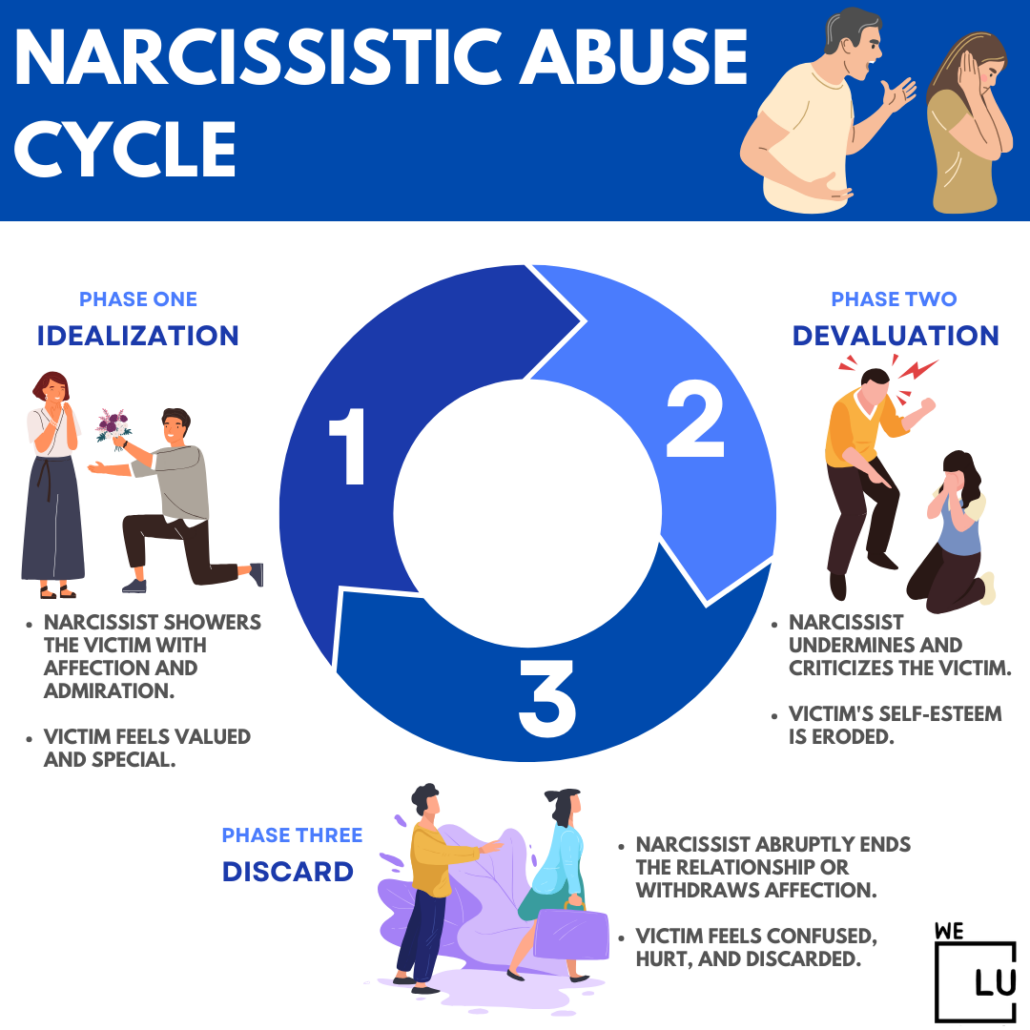Narcissistic Abuse Overview
Narcissistic abuse, characterized by a vicious cycle of manipulation and control, inflicts a debilitating syndrome on its victims. The lasting impact of this insidious form of psychological torment is evident in the emotional, mental, and physical toll it takes. Recognizing the signs is key to understanding the depths of this destructive dynamic. However, there is hope for recovery.
This article delves into the far-reaching effects of this abuse, outlines 15 telltale signs to watch for, and offers invaluable insights into effective strategies for reclaiming one’s life and embarking on healing and resilience. Understanding the narcissistic abuse cycle, navigating the complexities of narcissistic abuse syndrome, and charting a path toward recovery are essential steps in breaking free from the clutches of this devastating manipulation.
Narcissistic Abuse Cycle
The narcissistic abuse cycle consists of distinct phases that perpetuate the abuse. It begins with idealization, where the narcissist showers the victim with affection and admiration, making them feel valued and special. However, this phase quickly transitions to devaluation, as the narcissist starts to undermine and criticize the victim, eroding their self-esteem.
The devaluation phase paves the way for the third stage: discard. The narcissist abruptly ends the relationship or withdraws their affection, leaving the victim confused, hurt, and discarded. This painful experience can profoundly impact the victim’s self-worth and well-being.
Breaking free from the narcissistic abuse cycle requires understanding the patterns and actively engaging in recovery. It involves recognizing the signs, such as constant criticism, manipulation, gaslighting, and emotional or verbal abuse. Awareness of these red flags is crucial for individuals to protect themselves and seek support.


Skip To:
Learn More:
- Narcissistic Personality Disorder Treatment & Diagnosis
- Narcissist Quiz Free, Is My Parent A Narcissist?
- How to Deal With Narcissistic Parents, Signs, Traits & Co-Parenting Strategies
- 6 Traits of a Covert Narcissist, Signs, and How to Deal With One
- What is a Narcissist? Am I a Narcissist Test
- Narcissistic Abuse, Signs, Effects, & Treatments
Get Help. Get Better. Get Your Life Back.
Searching for Accredited Dual Diagnosis Mental Health Centers Near You?
Even if therapy failed previously, or are in the middle of a difficult crisis, we stand ready to support you. Our trusted behavioral health specialists will not give up on you. When you feel ready or just want someone to speak to about counseling alternatives to change your life call us. Even if we cannot assist you, we will lead you to wherever you can get support. There is no obligation. Call our hotline today.
FREE 24/7 Dual Diagnosis Mental Health Services HotlineWe Level Up Narcissistic Abuse Cycle Mental Health Center Tip
If you are caught in a narcissistic abuse cycle, prioritize your well-being. Establish clear boundaries to protect yourself emotionally and physically. Seek support from trusted friends, family, or a mental health professional who can provide guidance and validation. Please record the abuse to maintain clarity and build a case, should you need it. Consider creating a safety plan, and when possible, distance yourself from the abuser. Remember, your safety and mental health are top priorities, and seeking professional help can be crucial to breaking free from the cycle of narcissistic abuse.
Narcissistic Personality Disorder Fact Sheet
Narcissistic Personality Disorder Definition
Narcissistic Personality Disorder (NPD) is a mental health condition characterized by an inflated sense of self-importance, a constant need for admiration, and a lack of empathy for others.
Traits and Behaviors
- Grandiose sense of self-importance and entitlement.
- Exaggerated achievements and talents.
- Preoccupation with fantasies of unlimited success, power, or beauty.
- The constant need for admiration and attention.
- Lack of empathy for other’s feelings and needs.
- Exploitative behavior and a sense of entitlement.
- Envious of others or believes others are envious of them.
- Arrogant and haughty attitude towards others.
Causes and Risk Factors
- Early life experiences, such as excessive praise or excessive criticism/neglect.
- Genetic and biological factors may contribute to the development of NPD.
- Personality traits, such as low self-esteem and vulnerability to shame.
- Sociocultural factors emphasize individualism and achievement.
What is Narcissistic Abuse?
It refers to a pattern of manipulative and controlling behaviors inflicted by narcissistic individuals on their victims, causing emotional, mental, and sometimes physical harm.
Recovering from Narcissistic Abuse
Recovering involves a process of healing, rebuilding self-esteem, setting boundaries, and seeking support to overcome emotional wounds and regain personal empowerment.
Narcissistic Abuse Quotes
“Recovery from narcissistic abuse requires creating a new narrative where you are the hero, not the victim.”
“Don’t let the narcissist define your worth. Reclaim your power and rise above their manipulation.”
“Healing from narcissistic abuse starts with recognizing your strength and worthiness.”
Narcissistic Abuse Parents
Narcissistic abuse by parents refers to the detrimental and manipulative behaviors inflicted by narcissistic parents on their children, causing emotional, psychological, and sometimes physical harm.
Narcissistic Abuse Statistics
A pervasive issue that affects countless individuals around the world. This article aims to provide insight into the prevalence and impact of narcissistic abuse through statistical data. By examining these numbers, we can better understand the scope of the problem and the urgent need for awareness, support, and intervention.
By delving into these statistics, we can better understand the widespread nature of abuse, its impact on victims, and the urgent need for education, resources, and preventive measures. Together, we can work towards raising awareness, promoting healing, and advocating for change to combat the destructive effects of abuse.
- Prevalence: It can occur in various relationships, including intimate partnerships, parent-child relationships, and workplace environments. It is estimated that narcissistic personality disorder (NPD), often associated with narcissistic abuse, affects about 1% of the general population.
- Gender Differences: While individuals of any gender can experience narcissistic abuse, research suggests that narcissistic traits are more commonly found in men.
- Psychological Impact: Victims of abuse often experience severe psychological and emotional trauma. Studies have shown that victims may suffer from depression, anxiety, post-traumatic stress disorder (PTSD), low self-esteem, and other psychological symptoms resulting from the abuse.
- Long-term Effects: The effects of abuse can be long-lasting, with victims experiencing difficulties forming and maintaining healthy relationships, trusting others, and recovering their sense of self-worth and autonomy.
- Underreporting: It is often underreported due to the complex dynamics involved, fear of retaliation, and the subtle nature of psychological manipulation. Many victims may also struggle to recognize or articulate the abuse they have experienced.
1%
How much NPD affects the general population
Source: NIMH
2 – 3x Higher
NPD in males is approximately two to three times higher than in narcissistic personality disorder in women.
Source: NIMH
50-60%
Individuals with Narcissistic Personality Disorder (NPD) are estimated to have co-occurring mental health issues.
Source: NIMH

End the Emotional Pain. Get Your Life Back.
Feeling Depressed, Anxious or Struggling with Mental Health Illness? Get Safe Comfortable Mental Health Dual Diagnosis High-Quality Therapy From Counselors That Care. Begin Your Recovery Now.
Hotline (855) 940-6125Narcissistic Abuse Syndrome
Recognizing the signs of narcissistic abuse is a vital first step toward understanding the dynamics at play. These signs may include constant criticism, manipulation, gaslighting, emotional and verbal abuse, and a distorted sense of self. By becoming aware of these red flags, survivors can gain clarity and validation, empowering them to seek support and take steps toward recovery.
Recovering and overcoming NAS is a challenging but achievable process. It involves cultivating self-compassion, setting boundaries, and engaging in healing practices such as therapy or counseling. Through these avenues, survivors can gradually rebuild their self-esteem, address the psychological wounds inflicted by the abuser, and regain a sense of agency and empowerment.

Signs of Narcissistic Abuse
Recognizing signs of narcissistic abuse is essential for maintaining mental and emotional well-being. Narcissistic abuse is characterized by a pattern of manipulative behaviors employed by someone with narcissistic traits, resulting in emotional, psychological, or even physical harm to their victims.
Understanding these signs early on can empower individuals to establish boundaries, seek support, and break free from toxic relationships. Being aware of red flags indicating narcissistic abuse is vital, allowing for a proactive and informed approach to self-protection and healing.
- Manipulation: Narcissistic abusers often manipulate and exploit others for their gain. They use tactics such as gaslighting (making you doubt your reality), emotional blackmail, or playing mind games to control you.
- Lack of Empathy: Narcissistic abusers struggle to empathize with others. They often dismiss or belittle your feelings, needs, and experiences, making you feel invalidated or insignificant.
- Constant Criticism: They excessively criticize and demean you, often using insults, derogatory remarks, or sarcasm to undermine your self-esteem and confidence.
- Emotional Rollercoaster: Narcissistic abusers can create an emotional rollercoaster by alternating between love-bombing (excessive praise and affection) and devaluation (sudden withdrawal of love and affection) to keep you off balance and dependent on your approval.
- Control and Domination: They exert control over your life, making decisions for you, isolating you from friends and family, and invading your privacy. They may also use financial control or restrict your autonomy to keep you dependent on them.
- Blame-Shifting: Narcissistic abusers rarely take responsibility for their actions. Instead, they shift blame onto others, including you, making you feel guilty or responsible for their behavior.
- Boundaries Violation: They have little respect for personal boundaries and may invade your privacy, ignore your requests for space or autonomy, or engage in controlling behaviors without regard for your boundaries.
- Emotional and Psychological Manipulation: They employ various manipulative tactics, such as guilt-tripping, playing the victim, or using charm and charisma to manipulate your emotions and thoughts.
- Isolation and Alienation: Narcissistic abusers may isolate you from friends, family, or support networks, making you dependent on them for validation and approval. They may also engage in smear campaigns, spreading false information about you to discredit or isolate you.
- Emotional Exhaustion: A relationship with a narcissistic abuser can be emotionally draining. You may constantly feel on edge, anxious, or emotionally exhausted due to their unpredictable and toxic behavior.
First-class Facilities & Amenities
World-class High-Quality Mental Health Services & Behavioral Health Substance Abuse Treatment
Rehab Centers TourRenowned Mental Health Centers. Serene Private Facilities. Inpatient Rehab Programs Vary.
Mental Health Helpline (855) 940-6125Proven recovery success experience, backed by a Team w/ History of:
15+
Years of Unified Experience
100s
5-Star Reviews Across Our Centers
10K
Recovery Successes
- Comprehensive Dual-Diagnosis Treatment
- Complimentary Family & Alumni Programs
- Coaching, Recovery & Development Events
- Comfortable Onsite Medical Detox Center
Healing from Narcissistic Abuse
Healing is a challenging and transformative process that requires self-care, support, and self-reflection. The first step is acknowledging and validating your experience, understanding that the abuse was real and that your feelings are valid. It’s common to struggle with self-doubt and internalize blame, so remind yourself that you deserve healing and support.

Seeking support from trusted friends, family, or support groups can be beneficial. Surround yourself with individuals who can provide empathy, validation, and understanding. Consider seeking therapy from a mental health professional specializing in trauma and abuse recovery. They can guide you through the healing process, offer coping strategies, and help you rebuild your self-worth and trust.
Establishing and enforcing boundaries is crucial for your healing. Reclaim your limitations and learn to communicate and uphold them assertively. This may involve limiting contact with the narcissistic abuser, establishing boundaries with others, and prioritizing your well-being. Focus on self-care activities promoting physical, emotional, and mental well-being. Engage in activities that bring you joy, practice mindfulness or meditation, prioritize restful sleep, eat nutritious meals, and exercise regularly.
World-class, Accredited, 5-Star Reviewed, Effective Mental Health Dual Diagnosis Programs. Complete Integrated Inpatient Rehab with Free Post Discharge Therapy Planning.
CALL (855) 940-6125End the Emotional Pain Rollercoaster. Gain Stability & Happiness Through Recovery Treatment. Start Mental Health Counseling Today. Get Free No-obligation Guidance by Behaviroal Health Specialists Who Understand Mental Health Recovery.
Treatment for Narcissistic Abuse Recovery
Recovering from narcissistic abuse, characterized by the repetitive narcissistic abuse cycle, is a complex and individualized process. It involves addressing the traumatic effects of the abuse and working towards healing and rebuilding one’s life.
- Establishing Safety: Prioritize your safety and well-being by creating physical, emotional, and psychological boundaries. This may involve distancing yourself from the abuser, seeking support from trusted individuals, and ensuring a secure environment.
- Understanding Narcissistic Abuse: Educate yourself, including its dynamics and the tactics used by abusers. This knowledge can help you gain clarity, validate your experiences, and develop insights into abusive dynamics.
- Healing from Narcissistic Abuse Syndrome: It can contribute to the development of Narcissistic Abuse Syndrome, characterized by symptoms such as low self-esteem, self-doubt, anxiety, depression, and challenges in forming and maintaining healthy relationships. Recovery involves addressing these symptoms and working towards rebuilding self-worth and self-esteem.
- Recognizing Signs: Familiarize yourself with the signs of narcissistic abuse, such as constant criticism, gaslighting, manipulation, exploitation, isolation, and a lack of empathy or concern for your well-being. This awareness can empower you to identify abusive patterns and seek appropriate support.
- Therapy and Support: Seek professional help from therapists or counselors experienced in trauma and abuse recovery. They can provide a safe space to process your experiences, explore emotions, develop coping strategies, and work towards healing and recovery.
- Rebuilding Self-Esteem and Self-Identity: It often undermines self-esteem and self-identity. Engage in activities that promote self-care, self-compassion, and self-discovery. Surround yourself with supportive individuals who validate your experiences and encourage personal growth.
- Setting Boundaries: Learn to set and enforce healthy boundaries in relationships. This involves recognizing your needs and rights, communicating assertively, and surrounding yourself with individuals who respect and honor your boundaries.
- Healing Trauma: Address the emotional and psychological trauma caused by abuse through trauma-focused therapies, such as Eye Movement Desensitization and Reprocessing (EMDR) or Cognitive-Behavioral Therapy (CBT). These therapies can help process and heal trauma-related symptoms.
- Support Networks: Connect with support groups or communities of individuals who have experienced abuse. Sharing experiences, insights, and strategies with others who understand can provide validation, support, and a sense of belonging.
Experience Transformative Recovery at the We Level Up Treatment Center.
See our authentic success stories. Get inspired. Get the help you deserve.



Start a New Life
Begin with a free call to a behavioral health treatment advisor. Learn more about our dual-diagnosis programs. The We Level Up treatment center network delivers recovery programs that vary by each treatment facility. Call to learn more.
- Personalized Care
- Caring Accountable Staff
- World-class Amenities
- Licensed & Accredited
- Renowned w/ 5-Star Reviews
We’ll Call You
Narcissistic Abuse FAQs
-
What is Narcissistic Abuse Awareness Day?
Narcissistic Abuse Awareness Day is designated to raise awareness about abuse and its impact on individuals and communities.
-
How to heal from narcissistic abuse?
Healing involves seeking therapy, setting boundaries, practicing self-care, and building a support network.
-
What are signs you’re healing from narcissistic abuse?
Signs that you’re healing from abuse may include increased self-esteem, improved boundaries, reduced emotional triggers, and a sense of empowerment.
Watch How to Improve Mental Health? 8 Steps & Tips for Maintaining Your Mental Wellbeing. Find Top Mental Health Tips & Anxiety Tips Advice from a Therapist.
Search Drug & Alcohol Rehab / Detox & Mental Health Narcissistic Abuse Topics & Resources
Sources
- Brunell AB, et al. (2018). Are narcissists more attracted to people in relationships than to people not in relationships?
journals.plos.org/plosone/article?id=10.1371/journal.pone.0194106 - Diagnostic and statistical manual of mental disorders, 5th edition, text revision (DSM-5-TR). (2022). Washington, D.C.: American Psychiatric Association Publishing.
- Fatfouta R, et al. (2021). Are individualistic societies more narcissistic than collectivistic ones? A five-world region cross-cultural re-examination of narcissism and its facets.
sciencedirect.com/science/article/abs/pii/S0191886921005420 - Kacel EL, et al. (2017). Narcissistic personality disorder in clinical health psychology practice: Case studies of comorbid psychological distress and life-limiting illness.
ncbi.nlm.nih.gov/pmc/articles/PMC5819598 - Rose AB, et al. (2015). Narcissistic patients: Understanding and managing feelings and behaviors.
psychiatrist.com/pcc/delivery/patient-physician-communication/narcissistic-patients-understanding-managing-feelings - Wright AGC, et al. (2017). The effect of pathological narcissism on interpersonal and affective processes in social interactions.
ncbi.nlm.nih.gov/pmc/articles/PMC5679127 - Yakeley J. (2018). Current understanding of narcissism and narcissistic personality disorder.
cambridge.org/core/services/aop-cambridge-core/content/view/4AA8B04FB352F8E00AA7988B63EBE973/S2056467818000208a.pdf/current_understanding_of_narcissism_and_narcissistic_personality_disorder.pdf - Dashineau SC, Edershile EA, Simms LJ, Wright AGC. Pathological narcissism and psychosocial functioning. Personal Disord. 2019 Sep;10(5):473-478. doi: 10.1037/per0000347. Epub 2019 Jul 1. PMID: 31259606; PMCID: PMC6710132.
- Mitra P, Fluyau D. Narcissistic Personality Disorder. [Updated 2023 Mar 13]. In: StatPearls [Internet]. Treasure Island (FL): StatPearls Publishing; 2023 Jan-. Available from: https://www.ncbi.nlm.nih.gov/books/NBK556001/
- Weinberg I, Ronningstam E. Narcissistic Personality Disorder: Progress in Understanding and Treatment. Focus (Am Psychiatr Publ). 2022 Oct;20(4):368-377. doi: 10.1176/appi.focus.20220052. Epub 2022 Oct 25. PMID: 37200887; PMCID: PMC10187400.